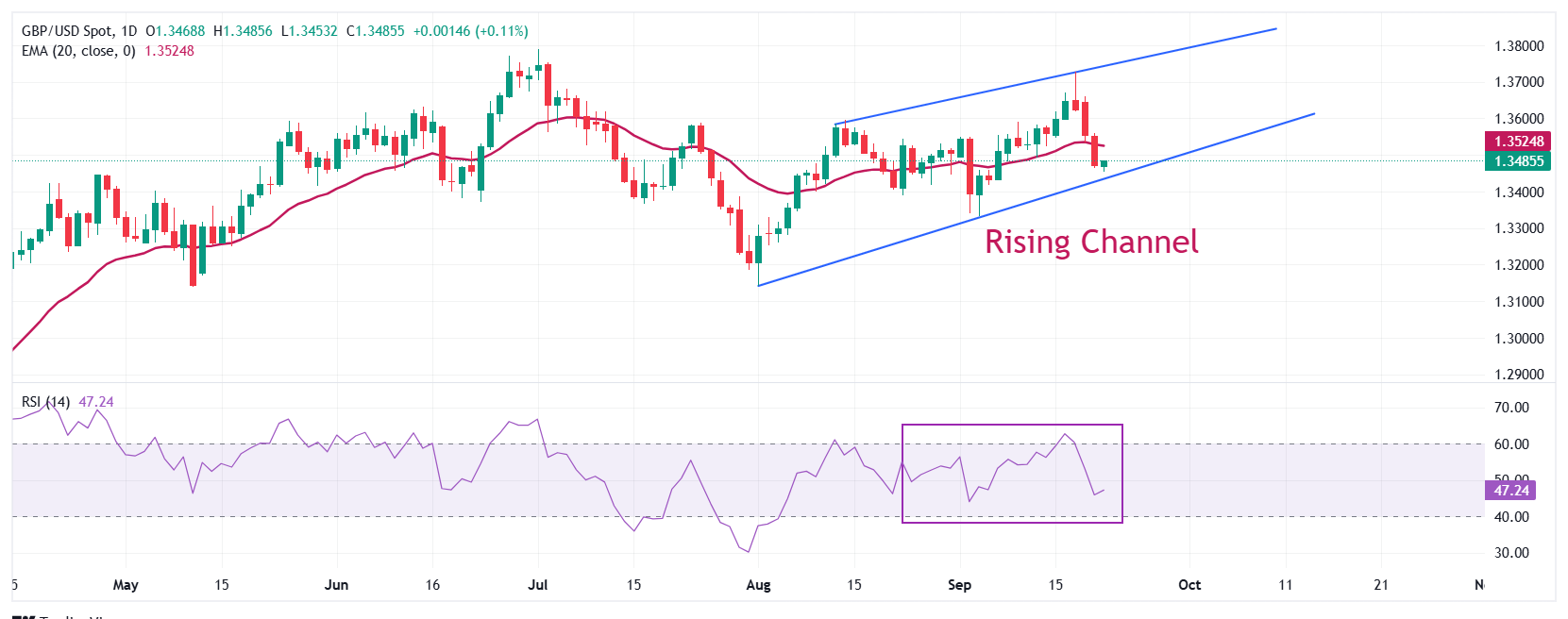Created
: 2025.09.22














![]() 2025.09.22 17:19
2025.09.22 17:19
The Pound Sterling (GBP) starts the week on a slightly positive note against its peers on Monday, bouncing back after facing intense selling pressure last week. However, the British currency remains on the back foot amid escalating United Kingdom (UK) fiscal worries, following a significant increase in Britain's public borrowings.
The data showed on Friday that UK public sector net borrowing hit nearly £18 billion in August. Economists expected government borrowing to come in significantly lower at £12.5 billion.
Worries regarding UK public borrowings have led to a sharp increase in long-dated government gilt yields. 30-year UK Gilt yields trade firmly near 5.57% on Monday, a move that could restrict administration from announcing higher spending in the Autumn Budget scheduled in November.
Meanwhile, investors worry that Chancellor of the Exchequer Rachel Reeves could raise the tax burden to offset the impact of the increase in public spending already announced in July.
On the economic data front, investors will focus on the preliminary UK S&P Global Purchasing Managers' Index (PMI) data for September, which will be released on Tuesday. The UK Services PMI is expected to come in lower at 53.6 compared to 54.2 in August.
In Monday's session, investors will focus on a speech from Bank of England (BoE) Governor Andrew Bailey for fresh cues on the monetary policy outlook, which is scheduled at 18:00 GMT.

The Pound Sterling ticks up to near 1.3480 against the US Dollar on Monday. However, the near-term trend of the GBP/USD pair remains bearish as it trades below the 20-day Exponential Moving Average (EMA), which trades around 1.3524. The Cable trades near the lower end of a Rising Channel formation around 1.3470.
The 14-day Relative Strength Index (RSI) has fallen sharply below 50.00. A fresh bearish momentum would emerge if the RSI breaks below 40.00.
Looking down, the August 1 low of 1.3140 will act as a key support zone. On the upside, the July 1 high near 1.3800 will act as a key barrier.
The Pound Sterling (GBP) is the oldest currency in the world (886 AD) and the official currency of the United Kingdom. It is the fourth most traded unit for foreign exchange (FX) in the world, accounting for 12% of all transactions, averaging $630 billion a day, according to 2022 data. Its key trading pairs are GBP/USD, also known as 'Cable', which accounts for 11% of FX, GBP/JPY, or the 'Dragon' as it is known by traders (3%), and EUR/GBP (2%). The Pound Sterling is issued by the Bank of England (BoE).
The single most important factor influencing the value of the Pound Sterling is monetary policy decided by the Bank of England. The BoE bases its decisions on whether it has achieved its primary goal of "price stability" - a steady inflation rate of around 2%. Its primary tool for achieving this is the adjustment of interest rates. When inflation is too high, the BoE will try to rein it in by raising interest rates, making it more expensive for people and businesses to access credit. This is generally positive for GBP, as higher interest rates make the UK a more attractive place for global investors to park their money. When inflation falls too low it is a sign economic growth is slowing. In this scenario, the BoE will consider lowering interest rates to cheapen credit so businesses will borrow more to invest in growth-generating projects.
Data releases gauge the health of the economy and can impact the value of the Pound Sterling. Indicators such as GDP, Manufacturing and Services PMIs, and employment can all influence the direction of the GBP. A strong economy is good for Sterling. Not only does it attract more foreign investment but it may encourage the BoE to put up interest rates, which will directly strengthen GBP. Otherwise, if economic data is weak, the Pound Sterling is likely to fall.
Another significant data release for the Pound Sterling is the Trade Balance. This indicator measures the difference between what a country earns from its exports and what it spends on imports over a given period. If a country produces highly sought-after exports, its currency will benefit purely from the extra demand created from foreign buyers seeking to purchase these goods. Therefore, a positive net Trade Balance strengthens a currency and vice versa for a negative balance.
![]()
Created
: 2025.09.22
![]()
Last updated
: 2025.09.22

FXStreet is a forex information website, delivering market analysis and news articles 24/7.
It features a number of articles contributed by well-known analysts, in addition to the ones by its editorial team.
Founded in 2000 by Francesc Riverola, a Spanish economist, it has grown to become a world-renowned information website.
We hope you find this article useful. Any comments or suggestions will be greatly appreciated.
We are also looking for writers with extensive experience in forex and crypto to join us.
please contact us at [email protected].
Disclaimer:
All information and content provided on this website is provided for informational purposes only and is not intended to solicit any investment. Although all efforts are made in order to ensure that the information is correct, no guarantee is provided for the accuracy of any content on this website. Any decision made shall be the responsibility of the investor and Myforex does not take any responsibility whatsoever regarding the use of any information provided herein.
The content provided on this website belongs to Myforex and, where stated, the relevant licensors. All rights are reserved by Myforex and the relevant licensors, and no content of this website, whether in full or in part, shall be copied or displayed elsewhere without the explicit written permission of the relevant copyright holder. If you wish to use any part of the content provided on this website, please ensure that you contact Myforex.
Myforex uses cookies to improve the convenience and functionality of this website. This website may include cookies not only by us but also by third parties (advertisers, log analysts, etc.) for the purpose of tracking the activities of users. Cookie policy